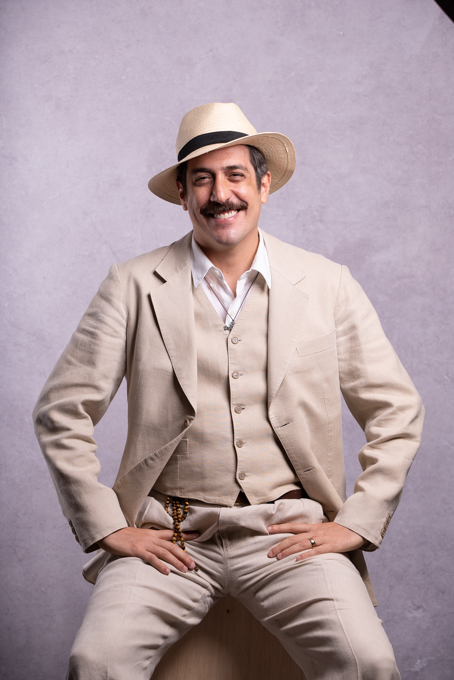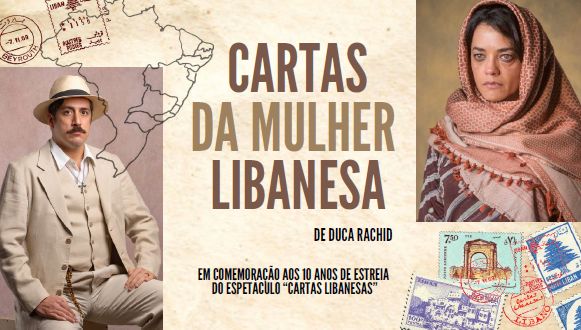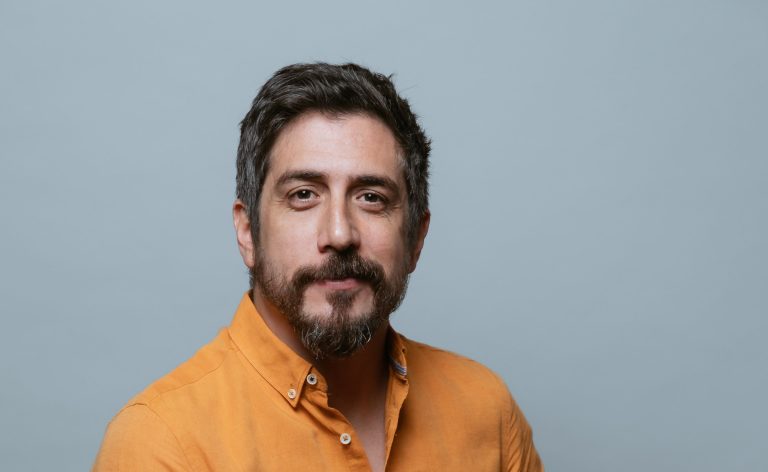São Paulo – Nearly ten years after Cartas Libanesas premiered, creator and actor Eduardo Mossri reflects on the project as a search for his family history and a journey of self-discovery. “I was under 30 when I had the idea for the play, and I didn’t really know how or why I was doing it. But learning about my grandparents’ story, along with so many others, helped me understand why I became an actor,” he says.
Born in Dar Baachtar, Emilia Elias came from Lebanon to fulfill a tradition among families: arranged marriages. She arrived at the age of 16 to marry João Antônio Mossri, an unknown older Lebanese man who had landed in Brazil years earlier and lived in Mogi das Cruzes, a city in São Paulo state, where a large number of immigrants and their descendants still reside to this day.
“I never knew my father’s father, but I always felt a very strong connection with my Lebanese grandmother. And [my grandmother’s] was also the side of the family whose history I knew the least,” she reveals. “I think about my father’s story, who grew up without uncles, aunts, cousins, or grandparents. He only had a father, a mother, and siblings. Being the child of immigrants is very hard, as references get lost.”

After Dona Emilia died, at the age of 98 according to official documents, her grandson found among her belongings a set of letters written in Arabic, carefully tied with a ribbon. “It was through this correspondence from relatives who stayed in Lebanon and whom she never saw again that I was able to understand just a little of how they were, their writing, the way they spoke. Among the letters I translated, for example, that to express longing, the writer used an entire page filled with dramatic metaphors: ‘my heart is in flames, burning with the absence of those I have not seen in so long…’”
The script for the play was finished in 2009, but before its debut in 2015, Mossri wanted the experience of living outside Brazil. “I chose to live in another country—I knew what I was going to do, and I had support. I went under the best possible conditions and spoke with my parents by phone and video, and even so, it wasn’t easy. So, that made me think about my grandparents, whose news came through letters, with months of delay in information, intensifying pain and longing, affection and difficulties.”
“Cartas Libanesas” is marked by a rich emotional depth, shifting between the hope for a better future and the pain of loss and uprooting. Playing the role of a peddler who leaves his pregnant wife in Lebanon to seek fortune in Brazil, Mossri received “unexpected and incredible” offers. One of them was the invitation to play Dr. Faruq, a Syrian doctor who immigrates to Brazil after losing his wife and son in the war, in “Órfãos da Terra” (Orphans of a Nation), written by Thelma Guedes and Duca Rachid (TV Globo, 2019), which centered on the refugee crisis.
The telenovela aired in the early evening slot, where stories are usually lighter. “This work received several international awards, including an Emmy, which I find symbolic. I believe the show’s great achievement was its ability to bring such a significant, delicate, and universally important topic to television drama.”
Another surprise brought by the play was an invitation from the Brazilian Embassy in Lebanon to perform in Beirut. “I had always wanted to visit my grandparents’ country, and this opportunity allowed me to go to the village where my grandmother was born. I never imagined theater would take me there.” He believes many people have a mistaken view of what it means to be an actor. “They think that because we travel with a play, for instance, life is easy. But I know the backstage of this highly artisanal profession, the challenges of securing sponsorship, and submitting projects to funding calls to make an idea possible…”
Graduated from the School of Communications and Arts of the University of São Paulo (USP), Mossri holds a bachelor’s degree in Acting, though he doesn’t believe that a degree is necessary to become an actor. “However, the wealth of knowledge, the exposure to various repertoires, the professionals I’ve met, and those exchanges—I believe these made a difference in my career.”
He recalls that during the first script readings for the role of the refugee doctor, his fellow cast members asked how he had come so prepared, even with a distinct accent. “I’m a theater actor and had to adjust for this style of TV acting, but we had excellent preparation. Plus, the story connected with my ancestry. It was a rewarding experience, consistent with my professional journey.”
Mossri’s new play

For Mossri, during this decade of performances, the show has matured, and in this process, the idea for a new play emerged. “I realized that the other side of the story was missing. Where is this woman’s voice? What does she feel, pregnant and far from her husband?”
To address these questions and build a dramaturgy, he invited Duca Rachid, who also has Lebanese heritage. In “Cartas da Mulher Libanesa” [Letters from the Lebanese Woman], husband and wife are on stage—they listen to each other but do not see one another. The work, which is set to premiere in 2025, is being created by a predominantly female team, “to ensure that female narratives are not erased, as has historically happened,” Mossri explains.
Read more:
Lebanese travelling salesman on stage in São Paulo
Translated by Guilherme Miranda




